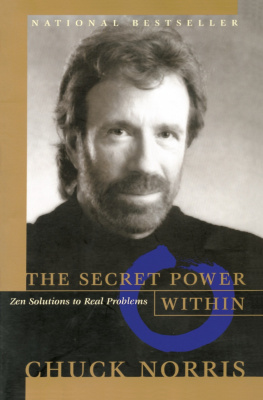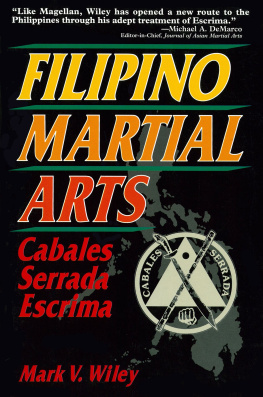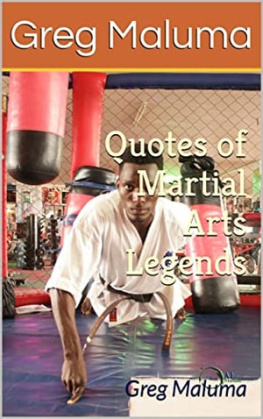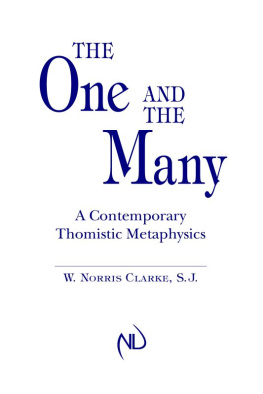| The Secret Power Within Zen Solutions to Real Problems |
| Chuck Norris |
| Harmony; Broadway Books ed edition (1997) |
|
| Tags: | Zen, Philosophy, Buddhism |
| Zenttt Philosophyttt Buddhismttt |
Chuck Norris has spent a lifetime studying the martial arts, earning several black belts and world championships. Now, through anecdotes about his own personal struggles and triumphs, Norris explains how the ancient system of Zenthe core philosophy behind the martial artscan help each of us achieve spiritual tranquillity and self-confidence.
The Secret Power Within is both a highly accessible lesson in Zen philosophy as well as the compelling story of Chuck Norriss own remarkable success. In this highly entertaining and inspiring account, Norris shows how Zen can be applicable to everyday situations, from the conference room to the living room. Chapters include:
- Winning by Losing: If you have nothing to prove, you have no need to fight.
- Complete the Wheel: How to balance your life to achieve success.
- Your Master, Your Art: To maintain self-respect you must respect the work you do, and do it as well as possible.
- My Way of Meditating: Norriss personal technique for achieving tranquillity under pressure.
The message is simple: There are no limits for the person who refuses to accept them.
It is better to light a candle than curse the gathering darkness.
Zkn yayin*
Copyright 1996 by Top Kick Productions
ePub Re-mastered by 'The Rddler' and 'Cadzbuddy'
All rights reserved. No part of this book may be reproduced in any form or by any electronic or mechanical means, including information storage and retrieval systems, without permission in writing from the publisher, except by a reviewrer who may quote brief passages in a review.
FIRST EDITION
Library of Congress Cataloging-in-Publication Data
Norris, Chuck, 1940
The secret power within : Zen solutions to real problems / by Chuck Norris.
p. cm.
ISBN 0-316-58350-2
1. Martial arts. 2. Zen Buddhism and martial arts. 3. Norris, Chuck, 1940-. 1. Title.
GV1102.N67 1996
796.8 dcao 95-45630
CIP
io 9 8 7 6 5 4
Published simultaneously in Canada by Little, Brown & Company (Canada) Limited
MV-NY
Printed in the United States of America
CONTENTS
THE SECRET POWER WITHIN
PREFACE
My first experience with Zen was in 1962 in Torrance, California. I was a young black belt and I had just started a martial arts school, which was one of the first in the Los Angeles area. The school, located in what had been a store, was right on the corner of two main streets. Cars passing by would slow down to look through the big windows, and people would often just walk in off the street to watch the classes for a while a karate class was something unusual back then. From time to time a monk wearing the saffron robes of a Buddhist would drop by. Id see him come in, be aware of him sitting there quietly watching me teach my students, and then Id look up to find that he was gone.
One day, at the end of a session, I went over to talk with him before he could leave. I learned he was from the Yogananda temple in downtown Los Angeles and that he, too, was a martial artist. The fact that we were both martial artists made him feel a certain kinship with me, and he had a lot he wanted to share. As we chatted, he mentioned the word ki several times, which he described as an internal force and said was related to Zen.
Zen: Today that little word has been reduced to a kind of catchphrase that can be attached to everything from learning to use the Internet to getting ahead in the business world. It has been detached from its original source so thoroughly that its meaning, at least for a great many people, has become a matter of personal conjecture. I doubt it would be used quite so often if people had to use its full name, Zen Buddhism, which is what the monk was talking about.
Although I had earned my black belt while I was in the air force in Korea I knew nothing about Zen. My Korean instructor had rarely mentioned it, at least not that I was aware of, for he spoke very little English, and although he could make himself understood when need be, he was most comfortable with a series of shouted commands. Id heard of ki, however, but it seemed vaguely mysterious, almost magical. And here was this monk talking about it as though it were something nearby.
Curious to learn more about both Zen and ki, I asked the monk more questions. He said, Lets step on the mat [training area].
My students for the day were gone, so I locked the front door and faced him on the mat.
Kneel down and close your eyes, he said, and concentrate on the third eye, which is between and slightly above your eyes. Focus on that third eye and concentrate.
I knelt on the floor, closed my eyes, and staring into that blackness I soon saw a dark spot about the size of a dime that was starting to get brighter.
As I was kneeling there, the monk told me more about ki.
From what he said I understood only that ki was some kind of universal force, everywhere around us, and that certain people were able to make use of it. He told me stories about the exploits of various monks and warriors in the fourteenth and fifteenth centuries, stories that involved using the power of ki. One of the stories was about a samurai who was set upon in the woods by a pack of wolves, but he just kept walking straight ahead, his countenance so stable, so self-aware yet potentially explosive that the animals were frozen in their tracks, and he passed safely through their midst. Another was about men lying in ambush to confront a victim who simply by gazing at them terrorized them so effectively that they were immobilized. While he was telling me these stories, the dark spot became as bright as the sun.
The monk finally told me to open my eyes, and when I did so, it was like waking up: I discovered Id been kneeling on the mat for four hours. When I tried to get up I felt excruciating pain the circulation in my legs had been cut off. The monk massaged my legs until the blood was flowing again. Then he said good-bye. After that experience, I went to the Yogananda temple in Los Angeles several times. The monk tried to convince me to convert, but my Christian faith was too strong.
But that was when I first became aware that there was more to the martial arts than just the physical, and it was a turning point in my life. Ive spoken to various people about that monk and the third eye, and I cant say Ive ever had a satisfactory explanation. But it was my first experience with Zen, and weird-as it was, it piqued my curiosity.
That was more than thirty years ago, and over the years my understanding of that other side of the martial arts has grown considerably. In the end, the idea of a third eye helps in an understanding of Zen, since Zen is another way of seeing you could even say a way of seeing with both your eyes closed.
This book is about what Ive seen and understood by looking through Zen. Its about my life and the lives of people Ive known, about real-life experiences that are in some way related to Zen or that make a special kind of sense when looked at in Zen terms. A lot of the stories here are from my background as a martial artist, because the arts and Zen are closely related. I entered Zen through the martial arts, beginning with the monk in his saffron robes, but studying martial arts is certainly not the only way to come to an understanding of Zen.
Some people come to Zen suddenly; after all, in its purest form, Zen is usually understood not just as enlightenment, but as sudden enlightenment, something like waking up from a deep sleep or from a deep distraction, meaning, waking up from the superficial confusions of this world. The stories of Zen adepts (experts) who have achieved such sudden awakenings are exciting to read and say a lot not just about Zen but about what Zen can mean today, how it can fit into our world. And it really does fit. People have reached enlightenment riding to work in a van crowded with carpoolers; some have reached enlightenment while shaving or leaning over to pick up a newspaper.












